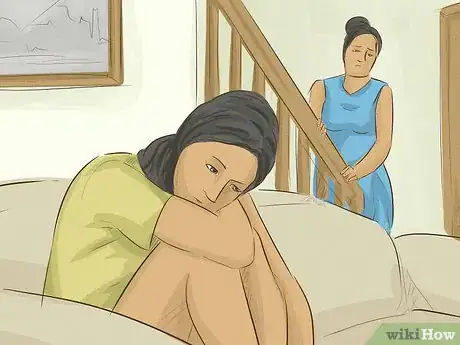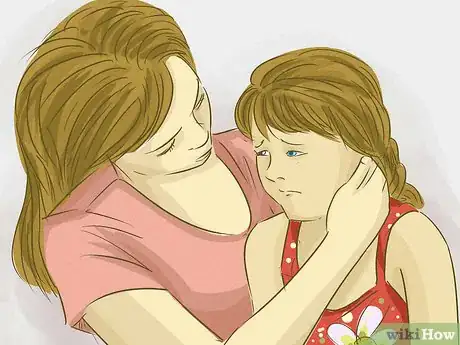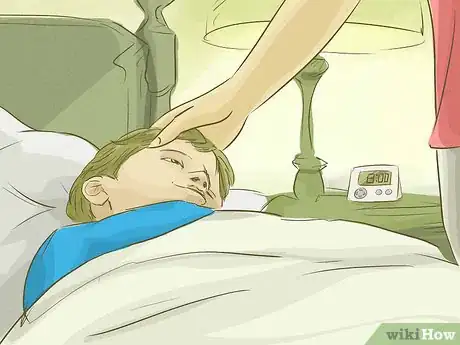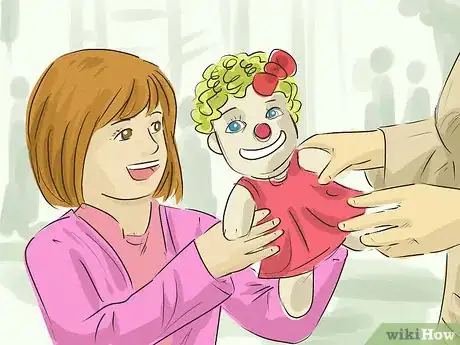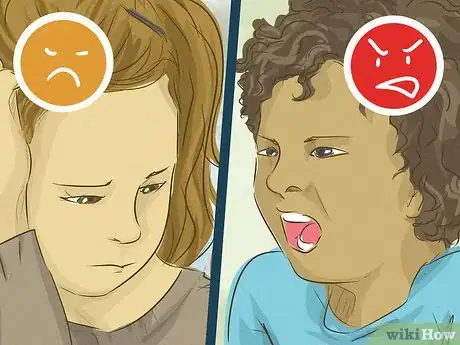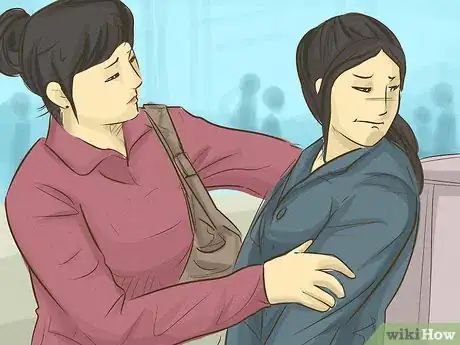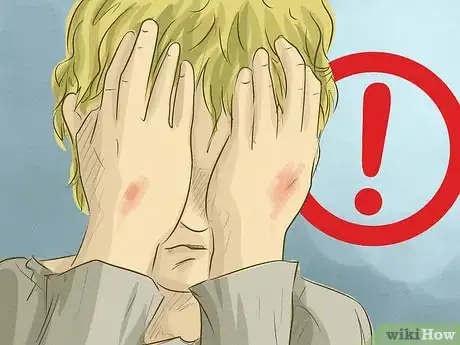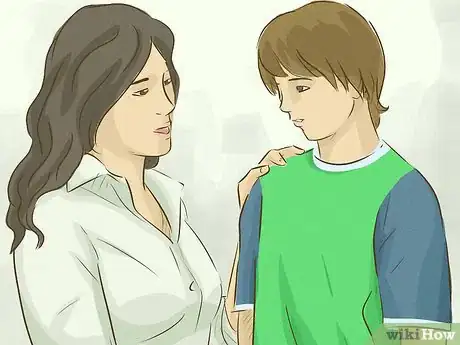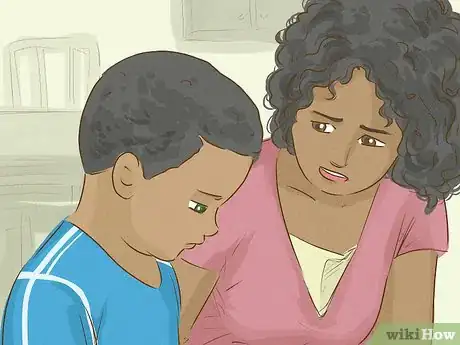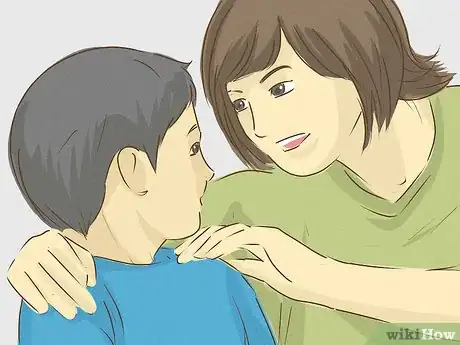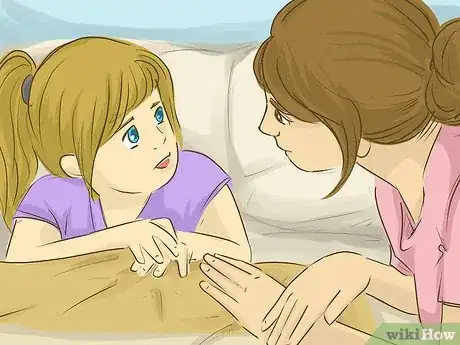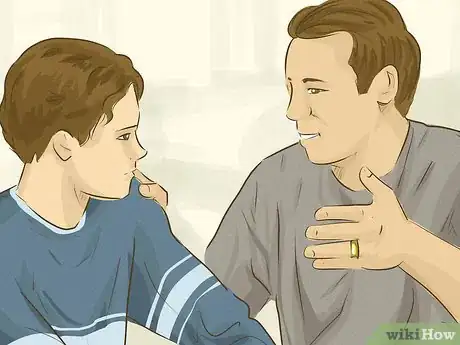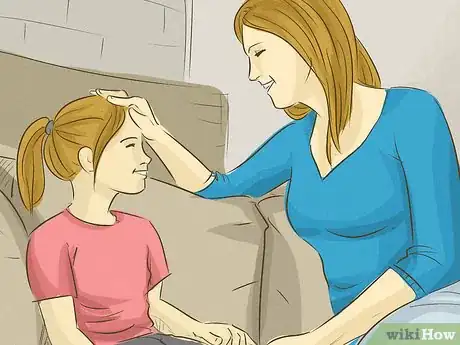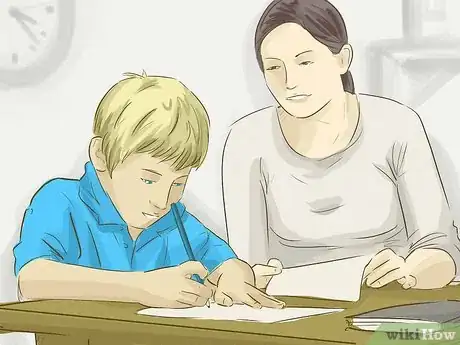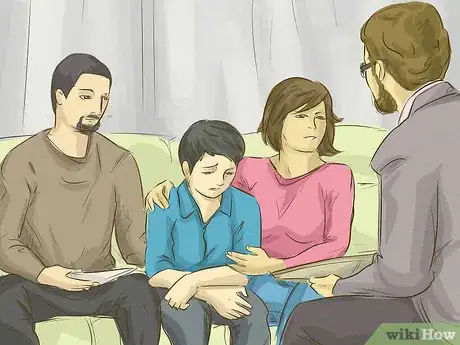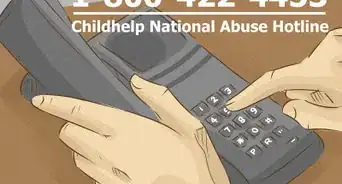This article was co-authored by Asa Don Brown, PhD, DNCCM, FAAETS. Dr. Asa Don Brown is a Clinical Psychologist with over 25 years of experience. He specializes in working with families, children, and couples, treating a variety of psychological disorders, trauma, and abuse. Dr. Brown has specialized in negotiation and profiling. He is also a prolific author having published three books and numerous articles in magazines, journals, and popular publications. Dr. Brown earned a BS in Theology and Religion with a minor in Marketing and an MS in Counseling with a specialization in Marriage and Family from The University of Great Falls. Furthermore, he received a PhD in Psychology with a specialization in Clinical Psychology from Capella University. He is also a candidate for a Masters of Liberal Arts through Harvard University. Dr. Brown is a Fellow of the American Academy of Experts in Traumatic Stress and a Diplomate for the National Center for Crisis Management and continues to serve a number of psychological and scientific boards.
wikiHow marks an article as reader-approved once it receives enough positive feedback. In this case, 100% of readers who voted found the article helpful, earning it our reader-approved status.
This article has been viewed 469,270 times.
If your child is acting unusually withdrawn and shy, it could be a sign that they are being molested. Look for the warning signs that abuse might be happening, and talk with your child about whether inappropriate touching has occurred. Acting quickly is the best way to help your child if they are experiencing abuse. See Step 1 to learn how to tell if your child is being molested and what to do next.
Steps
Looking for Signs
-
1See if your child seems unusually secretive. If your child is usually open and exuberant, but suddenly exhibits shy or secretive behaviour, this could be a sign that something is wrong. In many cases, children feel shame, embarrassment or confusion about what's going on, and since they don't know how to express their feelings, they keep it to themselves. Pay attention if your child seems quieter than usual.[1]
- A child may become quiet for reasons other than the occurrence of molestation, such as being bullied, going through their parents' divorce, and other circumstances. However, it should be viewed as a red flag that could point to molestation, especially if you notice other warning signs as well.
-
2Look for regression to younger behaviours. If your child suddenly begins acting younger than their age, be on high alert. If you can rule out other factors that could cause this change, such as bullying or another form of stress, it might be a sign of molestation. Here are a few examples of behaviours to watch for:[2]
- Bedwetting (after the age at which this normally occurs)
- Throwing tantrums and showing aggression for no apparent reason
- Clinging to you and crying when you have to depart after dropping the child off at school or daycare
- Thumb or finger sucking, bedwetting, baby talk, or separation anxiety.
Advertisement -
3Pay attention to nightmares and other sleeping problems. Most children experience nightmares or have insomnia every once in a while, so a few nights of poor sleep are probably nothing to worry about. However, if your child has regular nightmares, cries when you leave the room at night and is unable to fall asleep in their bedroom, this should be cause for alarm.
-
4Watch for inappropriate play behaviours. Sometimes children who are being molested act out the abuse on toys or other children. You might see your child demonstrating a sexualized behaviour and have no idea where they could have learned it. Watch the way your child plays with toys and other kids, and don't dismiss it if you notice something unusual.
- For example, a child who is being molested might touch a doll or toy inappropriately, or exhibit this behavior toward another child.
- A child might also use sexual words or phrases that they have never been taught.
- It is normal for young children to touch their private parts, as they are curious about their body and wish to explore it. But if they seem to be exhibiting adult behaviors while doing so, like using developmentally inappropriate language, then that is cause for alarm.
-
5Notice personality changes. If your child is normally happy and talkative, but begins to act shy and withdrawn, this might be a sign that some form of abuse is occurring. A shy child might start acting out and demonstrating behaviour that is out of character. Pay careful attention to mood swings that don't seem to stem from a logical cause.
-
6Watch your child's reaction to people and places. Does your child exhibit fear or signs of discomfort when they are around certain people or places? If your child runs and hides, falls silent or begins to cry around a certain person, that could be a warning sign.
- Some children are naturally shy, but you should be able to tell the difference between shyness and out-of-the-ordinary fear in your child's reaction to someone.
- See if your child demonstrates a peculiar aversion to a certain place, like school, piano lessons, a relative's house, and so on.
-
7Look for physical signs. Physical signs of sexual abuse are rare because perpetrators often don't want to leave a trace. However, it's important to know the physical signs of abuse so that you can recognise them right away if you see them. Here are physical signs that a child is being abused:[3]
- Sudden onset or relapse of bedwetting and soiling
- Pain, discoloration, bleeding or discharge in the mouth, genitals or anus
- Pain during urination and bowel movements
- Bruising around the genital area.
-
8Understand normal vs abnormal sexual behaviour. For example, normal sexual behaviour of children 0-5 years of age includes:[4]
- using childish language to talk about body parts
- showing curiosity about how babies are made
- touching or rubbing their own genitals
- having curiosity about their own genitals
Talking to Your Child
-
1Help your child feel safe talking. The subject of abuse is tough for children and adults to discuss, so it's important to do so in an environment that feels safe. Wait for a time when you and your child don't have anywhere you need to be, and pick a place that feels comfortable, like the family kitchen or den. Let your child know that you want to ask them some questions and that no matter what the answer is, they won't be in trouble.[5]
- Do not bring up the subject of abuse in front of anyone you don't trust completely. Don't bring it up in front of anyone you might suspect of abuse, including members of the child's immediate family.
- It's important to be entirely nonjudgmental and reassuring throughout the discussion. Do not be dismissive or try to lighten things up, or express anger - even if it's anger at the situation and not your child.
- Talking to your children about sexual abuse can be uncomfortable, but it’s important to have these conversations because having an understanding of what it is will help keep them safe.
-
2Ask if anyone has been touching them inappropriately. When your child is feeling comfortable, bring up the subject in a gentle but direct way. Ask whether anyone has touched your child in a way that's not appropriate. Use the words you and your child usually use to describe parts of the body that aren't supposed to be touched by other people.
- If your child says yes, encourage them to tell you more. Keep asking questions in a nonjudgmental way.
- Note that sometimes sexual molestation doesn't leave a negative impression on the child. Using words like "did someone hurt you" or "did someone touch you in a bad way" might not resonate with the child. Be more specific.[6]
-
3Ask about uncharacteristic behaviours you've noticed. For example, you could say that you've noticed your child seems afraid when you go to after-school care, or when a certain person comes to visit. If your child has been acting secretive, shy or aggressive, ask why. Name specific behaviours and ask your child to tell you what has been provoking them.
-
4Discuss the concept of secrets with your child. Sometimes an abuser will make the child promise to keep what happened a secret, perhaps even threatening the child to keep quiet. If your child tells you they have been told to keep a secret, let them know that it is almost never appropriate to ask a child to keep a secret from their parents. (The only possible exception would be if someone is planning a surprise for the parent.) Explain to your child that sometimes it's OK to tell a secret and that they won't get in trouble for telling.[7]
- Reassure them that they won’t get in trouble if they talk to you about something that made them uncomfortable or something they found unusual.
-
5Tell your child they can always come to you. Above all, it's important to help your child feel safe and unjudged when they talk to you. Tell your child that no matter what, you want to help and keep them safe from harm. If you have a trusting relationship with your child, they will be more likely to come to you if abuse does occur.
Protecting Your Child
-
1Know what constitutes abuse. Child abuse can take on many different forms, and it's important to know how to recognize each of them. Not all sexual abuse is physical, so even if your child isn't being molested, they could be in harm's way. Here are examples of the types of abuse that can occur:[8]
- Touching a child's genitals for sexual pleasure
- Making a child touch someone else's genitals (an adult's or another child's)
- Showing pornography to a child
- Taking inappropriate pictures of a child
- Showing a child an adult's genitals or encouraging a child to watch sexual acts
-
2Teach your child that certain body parts are private. From a very early age, teach your child that certain body parts should never be touched by someone other than the child. Many parents define these body parts as everything that would be covered by a bathing suit. Teach your child that if someone attempts to touch them in a private area, they should say "no" and tell you as soon as possible.
- Some parents use the "good touch, bad touch, secret touch" method to teach their children about touching. A good touch is one that is welcome, like a high five. A bad touch is one that hurts, like a kick or punch. A secret touch is one that a child is told to keep a secret. Tell your child to let you know right away if a bad or secret touch happens.
- Teach your child that there are parts of their body that are private, but their entire body should be respected at all times. Teach them that it is okay to say no to things they are uncomfortable with and to immediately get away from anyone who won’t respect their boundaries.
-
3Build a trusting relationship with your child. Kids are a lot more likely to confide in their parents if they aren't afraid they'll get in trouble. They must also feel that their parents will believe what they say. Start fostering a trusting and positive relationship with your child so that they know that no matter what, you're there to help.
- If your child brings up a problem - even a problem unrelated to potential abuse - never be dismissive. Always take your child seriously and help your child find a way to solve the problem.
-
4Get in the habit of talking every day. One important way to create open lines of communication with your child is to have regular conversations. Maybe your schedule is packed and you're always on the go, but make time every day to ask your child about their life. Stay on top of your child's activities, who they spend time with, and how they are feeling every single day. That way, if something out of the ordinary occurs, you'll know right away.
- Make sure your child is feeling emotionally supported, too. Children who don't feel they are getting enough attention at home are more vulnerable to predators.
-
5Get involved at your child's school and be present at their activities. Sexual predators tend to target kids who don't seem like they have much adult supervision. Be there for your child's games, practices, rehearsals and field trips. If you plan to leave your child in the care of someone else, make sure you know and trust them - from extended family members to teachers to coaches and family friends.
-
6Act on what your child tells you. If your child tells you they are being molested, do not dismiss it - even if the news is completely shocking. Remember that most perpetrators of sexual abuse are people the child knows and trusts.[9] Just 10% are strangers to the child. If you have reason to believe someone is abusing your child, take these steps:
- Keep your child away from the abuser.
- Call the Emergency Services and report the abuser to the local authorities. Call the National Child Abuse Hotline at 1.800.4.A.CHILD for more information about reporting the abuse.
- Get medical attention for your child. It's important to take your child to the doctor to find out if they were physically harmed.
- Take your child to counseling. The psychological trauma of abuse often outlasts the physical trauma. Therapy can help your child find ways to cope.[10]
Expert Q&A
-
QuestionHow do you know if your child is emotionally disturbed?
 Asa Don Brown, PhD, DNCCM, FAAETSDr. Asa Don Brown is a Clinical Psychologist with over 25 years of experience. He specializes in working with families, children, and couples, treating a variety of psychological disorders, trauma, and abuse. Dr. Brown has specialized in negotiation and profiling. He is also a prolific author having published three books and numerous articles in magazines, journals, and popular publications. Dr. Brown earned a BS in Theology and Religion with a minor in Marketing and an MS in Counseling with a specialization in Marriage and Family from The University of Great Falls. Furthermore, he received a PhD in Psychology with a specialization in Clinical Psychology from Capella University. He is also a candidate for a Masters of Liberal Arts through Harvard University. Dr. Brown is a Fellow of the American Academy of Experts in Traumatic Stress and a Diplomate for the National Center for Crisis Management and continues to serve a number of psychological and scientific boards.
Asa Don Brown, PhD, DNCCM, FAAETSDr. Asa Don Brown is a Clinical Psychologist with over 25 years of experience. He specializes in working with families, children, and couples, treating a variety of psychological disorders, trauma, and abuse. Dr. Brown has specialized in negotiation and profiling. He is also a prolific author having published three books and numerous articles in magazines, journals, and popular publications. Dr. Brown earned a BS in Theology and Religion with a minor in Marketing and an MS in Counseling with a specialization in Marriage and Family from The University of Great Falls. Furthermore, he received a PhD in Psychology with a specialization in Clinical Psychology from Capella University. He is also a candidate for a Masters of Liberal Arts through Harvard University. Dr. Brown is a Fellow of the American Academy of Experts in Traumatic Stress and a Diplomate for the National Center for Crisis Management and continues to serve a number of psychological and scientific boards.
Clinical Psychologist Evaluate if there's something that can explain their issues. Children are susceptible to sudden and dramatic changes. A child who has experienced a sudden shift in their familial environment may feel unsafe, abandoned, and uncertain about how to manage feelings around such change. It’s important to remember that children may act out when dramatic changes occur.
Evaluate if there's something that can explain their issues. Children are susceptible to sudden and dramatic changes. A child who has experienced a sudden shift in their familial environment may feel unsafe, abandoned, and uncertain about how to manage feelings around such change. It’s important to remember that children may act out when dramatic changes occur.
Warnings
- If your suspicions are confirmed about your child being molested take immediate actions, immediately investigate your child's pals, teachers, friend's parents and so on and report it to the police.⧼thumbs_response⧽
References
- ↑ http://www.parentsprotect.co.uk/warning_signs.htm#
- ↑ http://www.parentsprotect.co.uk/warning_signs.htm#
- ↑ http://www.parentsprotect.co.uk/warning_signs.htm#
- ↑ http://www.childmolestationvictims.com/warning-signs-of-child-molestation/#
- ↑ http://www.helpguide.org/mental/child_abuse_physical_emotional_sexual_neglect.htm
- ↑ https://www.rainn.org/get-information/types-of-sexual-assault/child-sexual-abuse/if-you-suspect
- ↑ https://www.rainn.org/get-information/types-of-sexual-assault/child-sexual-abuse/if-you-suspect
- ↑ http://www.parentsprotect.co.uk/warning_signs.htm#
- ↑ https://www.apa.org/pi/families/resources/child-sexual-abuse.aspx
